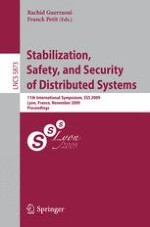2009 | OriginalPaper | Chapter
Oracle-Based Flocking of Mobile Robots in Crash-Recovery Model
Authors : Samia Souissi, Taisuke Izumi, Koichi Wada
Published in: Stabilization, Safety, and Security of Distributed Systems
Publisher: Springer Berlin Heidelberg
Activate our intelligent search to find suitable subject content or patents.
Select sections of text to find matching patents with Artificial Intelligence. powered by
Select sections of text to find additional relevant content using AI-assisted search. powered by
This paper considers a system of autonomous mobile robots that can move freely in a two-dimensional plane, and where a number of them can fail by crashing. The crash of a robot can be either permanent or temporary, that is, after its crash the robot either executes no action or it recovers from its failure. These robots repeatedly go through a succession of activation cycles during which they observe the environment, compute a destination and move. In particular, we assume weak robots, in the sense that robots cannot communicate explicitly between each other. Also, they cannot remember their past computations (i.e., oblivious). Finally, robots do not agree on a common coordinate system.
In this paper, we address a fault-tolerant flocking problem under the crash-recovery model. That is, starting from any initial configuration, a group of non-faulty robots are required to form a desired pattern, and move together while following a robot leader on a given trajectory, and keeping such a pattern in movement. Specifically, we propose a fault-tolerant flocking algorithm in the semi-synchronous model that allows correct robots to dynamically form a regular polygon in finite time, and maintain it in movement infinitely often. Our algorithm relies on the existence of two devices, namely an eventually perfect failure detector oracle to ensure failure detection, and an eventual leader oracle to handle leader election. The algorithm tolerates permanent crash failures, and also crash recovery failures of robots due to its oblivious feature. The proposed algorithm ensures the necessary restrictions on the movement of robots in order to avoid collisions between them. In addition, it is self-stabilizing.
